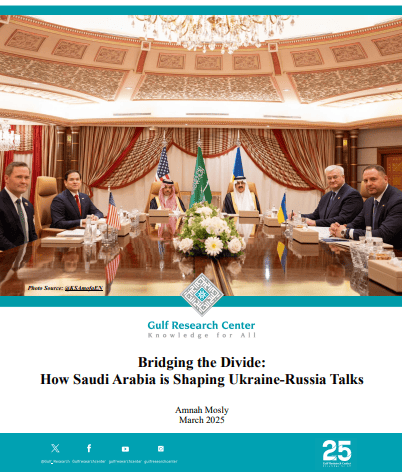
The ongoing Ukraine-Russia conflict has significantly altered the geopolitical landscape, with various actors attempting to influence its trajectory. Following a contentious meeting between Ukrainian President Volodymyr Zelenskyy, U.S. President Donald Trump, and U.S. Vice President JD Vance, European nations have vocally supported Ukraine but struggle to formulate a cohesive strategy for a resolution. Meanwhile, Saudi Arabia is emerging as a key player, leveraging its diplomatic ties with both Russia and Ukraine to bridge the divide between the two conflicting countries.
Since the outset of the crisis, Saudi Arabia has pursued a balanced approach to the conflict. While the Kingdom has refused to join Western sanctions against Russia, it has also repeatedly condemned the Russian aggression. On February 23, 2023, Saudi Arabia voted in favor of a United Nations General Assembly (UNGA) resolution that called for Russia to end hostilities in Ukraine and called for the withdrawal of its forces. In October 2023, the Kingdom also voted for the UNGA resolution against the annexation of four Ukrainian regions following its vote in March in support of the UNGA resolution that supported international law, the UN charter, and the sovereignty and territorial integrity of states, including Ukraine. It can, therefore, be argued that Saudi Arabia’s voting record demonstrates a “commitment to the fundamental principles of the UN Charter and international law, and its commitment to respecting state sovereignty, the principles of good neighborliness, and resolving conflicts by peaceful means.”
The Kingdom’s relationships with both Russia and Ukraine positioned it to play a more influential role as pressure to find a diplomatic solution as the conflict continues. During his visits to both Ukraine and Russia in March 2023, Saudi Foreign Minister H.H. Prince Faisal bin Farhan underlined that “the Kingdom is ready to mediate to resolve the crisis in Ukraine,” speaking during a press conference with his Russian counterpart, Sergey Lavrov, in Moscow.
Saudi Arabia already plays an extended humanitarian role and has provided substantial aid to Ukrainian refugees. During their visit in February 2023, H.H. Prince Faisal bin Farhan and President Zelenskyy signed agreements totaling $400 million, which included $300 million in oil derivatives for Ukraine and $100 million in humanitarian assistance through the King Salman Humanitarian Aid and Relief Centre (KSRelief). More recently, in March 2025, KSRelief signed a $5.15 million cooperation agreement with the UN Population Fund to provide emergency protection for vulnerable groups in Ukraine.
Relations between Saudi Arabia and Russia have equally followed a steady path over the past years, with an emphasis on energy and economic relations. The formation of the Saudi-Russian Joint Committee in 2017 and the Saudi-Russian Business Council in 2021 has helped to diversify and widen the foundation of economic cooperation and establish a platform for business and investment that can advance trade by utilizing the opportunities presented by Saudi Arabia’s Vision 2030 and the projects undertaken by the Kingdom. Given Russia’s role in energy markets coupled with market uncertainty surrounding the global economy and oil market outlook, Saudi Arabia views a cooperative relationship with Russia on energy matters as beneficial for the overall state of the world’s economy.
Saudi Arabia’s current stance facilitated Russian President Vladimir Putin’s visit to Riyadh on December 6, 2023, within the framework of bilateral relations. While in Riyadh, President Putin expressed his support and appreciation for continued efforts, stating, “Nothing can prevent the development of our friendly relations.” This includes humanitarian and political steps undertaken by Saudi Arabia in facilitating Ukrainian-Russian prisoner exchanges. The release of ten prisoners from Morocco, the United States, Great Britain, Sweden, and Ukraine in September 2022 underlined the role a country like Saudi Arabia can play in an environment marked by direct conflict.
As part of the 32nd Arab League Summit in May 2023 held in Jeddah, the Kingdom extended an invitation to President Zelenskyy to present his perspective and continue the discussion on how Arab countries can support the Ukrainian position. This was followed by a meeting hosted by Saudi Arabia in August 2023 that brought together national security advisers and representatives from over 40 countries, along with officials from the United Nations and the European Union. The participants agreed to continue consultations and exchange opinions to find a pathway to peace between Russia and Ukraine. Overall, the talks allowed for a broader discussion on the way forward. While no official statement was released, Ukraine called the meeting “productive” in promoting further dialogue on a peaceful resolution.
With the incoming U.S. Trump administration, Saudi Arabia’s role has taken on more concrete forms. In February 2025, the Kingdom hosted the first high-level talk between U.S. and Russian officials in over four years, when Russian Foreign Minister Sergei Lavrov and U.S. Secretary of State Marco Rubio met in Riyadh. The discussion was held in the presence of Saudi Foreign Minister H.H. Prince Faisal bin Farhan and Saudi Minister of State and National Security Advisor H.E. Musaed Al-Aiban.
Following the meeting, the U.S. Secretary of State announced that Russia and the U.S. had agreed to work toward ending the crisis in Ukraine and improving their diplomatic and economic ties. The two sides broadly agreed to pursue three goals: restore staffing at their respective embassies in Washington and Moscow, create a high-level team to support Ukraine peace talks and explore closer relations and economic cooperation. The meeting is seen as paving the way for a summit between President Donald Trump and President Vladimir Putin, possibly also in the Kingdom.
Saudi Arabia also welcomed Ukrainian President Volodymyr Zelenskyy in Riyadh for talks on March 11, 2025. President Zelenskyy referred to the talks as a “good meeting,” writing on X that he “acknowledged the Crown Prince’s efforts in bringing true peace closer. Saudi Arabia provides a crucial platform for diplomacy, and we appreciate this.” This was followed by discussions between representatives from Washington and Kyiv regarding a peace framework to end the crisis. According to American and Ukrainian officials, President Trump’s administration agreed to lift its suspension of military aid and intelligence sharing for Ukraine, and Kyiv signaled that it was open to a 30-day ceasefire with Russia, pending Moscow’s agreement.
The outcome of the most recent talks in Jeddah is a reflection of the growing role Saudi Arabia has taken on in the Russia-Ukraine conflict. Overall, it can be argued that the Kingdom is adopting a “multi-alignment” approach to better navigate the complexities of great power rivalries. By using this strategy, Riyadh aims to ease regional tensions and create pathways for resolving the persistent conflicts that have contributed to volatility in the Middle East and beyond. Saudi Arabia views the dedication to mediation, conflict resolution, and multi-alignment as essential for the way forward.
This encompasses Riyadh’s readiness to facilitate peace discussions and act as a platform for engagement with both Moscow and Kyiv, all while preserving robust relationships with its Western partners. Saudi Arabia’s strategic adaptability to evolving regional and global dynamics has opened the door for potential success in fostering regional stability and promoting international collaboration.
*Amnah Mosly is a Researcher at the Gulf Research Center (GRC)

